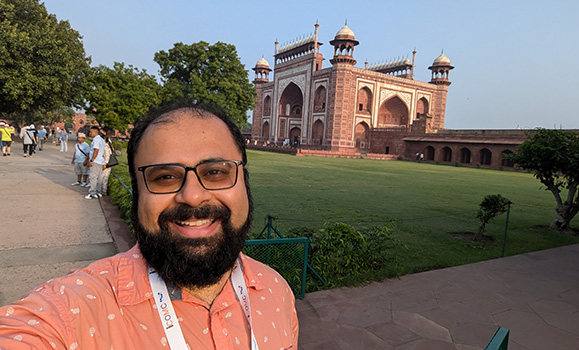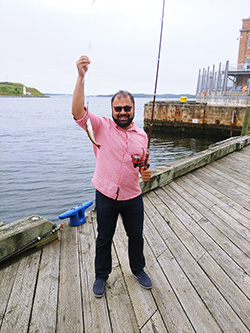Sciographies is a radio show and podcast about the people who make science happen, presented by The Faculty of Science and campus-community radio station CKDU 88.1 FM. This is the seventh article in a series that features excerpts from each new episode released this fall.
On this week’s episode of Sciographies, we talk to Dr. Saurabh Chitnis, a synthetic chemist at ÃÀÅ®×ö°®, shares his academic journey and passion for chemistry. Born in Libya to Indian parents and later moving to Canada, Chitnis reflects on his formative experiences in multiple countries, with Halifax now feeling like home.
 Visiting Agra for a conference (Submitted photo).
Visiting Agra for a conference (Submitted photo).

He recalls his undergraduate studies at McMaster University, where he first discovered chemistry after seeing a posting for a summer research position.
Dr. Chitnis also delves into the creative and unpredictable nature of chemistry, emphasizing how scientists often craft molecules that have never existed before. He also discusses his current research, focusing on the heaviest elements and the relativistic effects that change their chemical behavior.
This episode showcases his enthusiasm for discovery and his unique approach to exploring the mysteries of molecular chemistry while also having a passion for cooking and finding the best Indian cuisines.
Seen right: Fishing off the pier in Halifax Harbour. (Karlee Bamford photo)
Here are some excerpts from the podcast episode, edited for clarity and length.
Barclay: In your undergrad did you belong to a fraternity?
Chitnis: I lived off campus for all four years. I was actually not very much into the fraternity scene because I had a house with seven other people. That's all you need.
Barclay: Any rituals?
Chitnis: No rituals. The most rebellious thing we did was we farmed in the backyard when the landlord told us not to. He had grass, we dug it up and we planted crops that we had no business knowing how to grow. And in fact, it was a minor catastrophe because we had a squash crop that could feed an army.
Barclay: Where are you from?
Chitnis. This is actually a very difficult question for me. I was born in perilous country called Libya to Indian parents who were kind of living out their wanderlust by being there. When I was two or three years old, we moved to India and I grew up there before coming to Canada.
Barclay: How did you get the idea to do research in chemistry?
Chitnis: I didn't have the idea until after first year. I was wandering the halls (McMaster University) trying to find a job for the summer so that I wouldn't have to move back home to Toronto with my parents. Classic motivation. And on the fourth floor of the chemistry building, there's a handwritten sign outside a professor's door saying, ‘looking for a research helper,’ I thought, okay, I could be a researcher.
Barclay: What was it like?
Chitnis: It was a very exciting opportunity as an undergraduate researcher. You got to experience a side of chemistry that you see on TV. You got to understand how to control thing like the explosion of colour and how to isolate and study in a very safe and systematic manner.
Barclay: Is there a creative side to chemistry?
Chitnis: I think, something that people don't appreciate about chemistry is that it's a very creative enterprise. In the sense that you're creating the subject that you study. You know, you go into the lab and you are the first one in the known universe to have made that bit of a molecule using the chemical alphabet.
Listen to the entire episode of Sciographies at 4:30 PM today on in Halifax or find it on , , and other popular podcasting platforms. You can also listen to previous Sciographies episodes on the same platforms and at dal.ca/sciographies.

